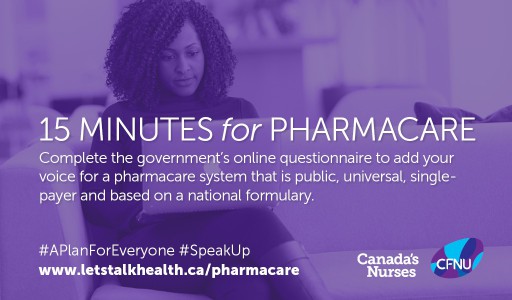UNA members encouraged to provide feedback on national pharmacare
United Nurses of Alberta members are encouraged to offer their opinions in a national online survey about the future of Pharmacare in Canada.
Following the federal government’s launch the of Advisory Council on the Implementation of National Pharmacare, leaders of Canada’s nurses’ unions called for the creation of a national prescription drug program that is:
- Public, to seamlessly incorporate prescription drug coverage into the greater public health care system.
- Universal, to ensure coverage is based on need and not ability to pay.
- Single-payer, to effectively leverage bulk buying to bargain down prices for covered prescription medications.
- Based on a national formulary with a primary objective to maximize health benefits per dollars spent, using value-for-money and clinical assessments.
The nursing leaders also called for strong federal leadership through legislation, appropriate federal transfer funding, and ensuring the massive system-wide savings are redistributed fairly so that provinces, patients and our public health care system benefit all.
By implementing a pharmacare plan for everyone, Canada can bring down the inflated cost of prescription drugs while ensuring accessible to all Canadians regardless of income.
The Advisory Council is inviting Canadians to share their views on national pharmacare before the September 28, 2018 deadline. You can complete the Council’s online questionnaire or provide a written submission via email or mail. Learn more about Pharmacare.
With nearly one in four Canadian households reporting an inability to afford prescription medicines as they are prescribed, pharmacare is a common-sense solution to financial barriers in accessing medicines.
With more than 100 public and 100,000 private insurance plans, Canada’s per capita prescription drug prices have risen to the third highest in the world. A single, universal drug plan could result in efficiencies and savings to the tune of between $4 and $11 billion per year in funds already being spent.

